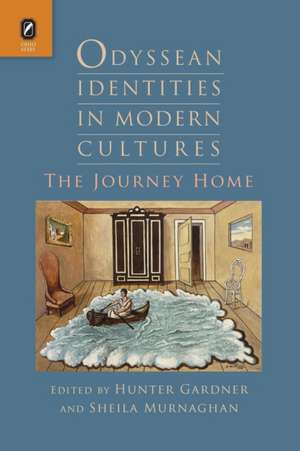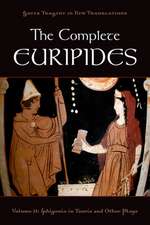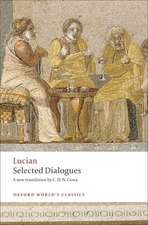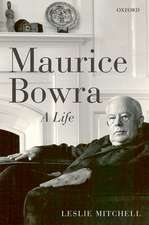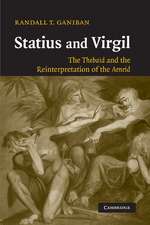Odyssean Identities in Modern Cultures: The Journey Home: Classical Memories/Modern Identitie
Autor Hunter Gardner, Sheila Murnaghanen Limba Engleză Paperback – 31 mai 2016
Addressed to both classicists and students of modern culture, Odyssean Identities in Modern Cultures: The Journey Home traces the Odyssey’s central theme of homecoming in a wide range of narratives from the late nineteenth to the early twenty-first century. Accounts of the journey home in novels, plays, lyric poems, paintings, and a television series explore the challenges of returning from a long absence to reclaim a former life.
These retellings raise fresh questions about the relationship between home and the identities we expect to find rooted there and stress the elusiveness of a satisfying homecoming. They remind us that the Odyssey’s happy ending is itself qualified by the hero’s unsettled future, the violence of his return, and the independent desires of his friends and family members. At the same time, they highlight new obstacles to homecoming posed by the modern world with its political and economic upheavals, newly configured family relations and gender roles, and diminished confidence in the stability of identity. The authors discussed include Charlotte Yonge, James Joyce, Virginia Woolf, Rebecca West, George Seferis, Yannis Ritsos, Gwendolyn Brooks, Charles Frazier, W. B. Sebald, Marilynne Robinson, and Zachary Mason.
These retellings raise fresh questions about the relationship between home and the identities we expect to find rooted there and stress the elusiveness of a satisfying homecoming. They remind us that the Odyssey’s happy ending is itself qualified by the hero’s unsettled future, the violence of his return, and the independent desires of his friends and family members. At the same time, they highlight new obstacles to homecoming posed by the modern world with its political and economic upheavals, newly configured family relations and gender roles, and diminished confidence in the stability of identity. The authors discussed include Charlotte Yonge, James Joyce, Virginia Woolf, Rebecca West, George Seferis, Yannis Ritsos, Gwendolyn Brooks, Charles Frazier, W. B. Sebald, Marilynne Robinson, and Zachary Mason.
Preț: 348.09 lei
Nou
Puncte Express: 522
Preț estimativ în valută:
66.62€ • 68.66$ • 56.25£
66.62€ • 68.66$ • 56.25£
Carte tipărită la comandă
Livrare economică 25 februarie-03 martie
Preluare comenzi: 021 569.72.76
Specificații
ISBN-13: 9780814252970
ISBN-10: 0814252974
Pagini: 352
Dimensiuni: 152 x 229 x 25 mm
Greutate: 0.52 kg
Ediția:1
Editura: Ohio State University Press
Colecția Ohio State University Press
Seria Classical Memories/Modern Identitie
ISBN-10: 0814252974
Pagini: 352
Dimensiuni: 152 x 229 x 25 mm
Greutate: 0.52 kg
Ediția:1
Editura: Ohio State University Press
Colecția Ohio State University Press
Seria Classical Memories/Modern Identitie
Recenzii
“This collection makes an important contribution to the scholarship on the reception of Homer’s Odyssey. The individual essays are expertly done and reflect a high level of scholarship. Each offers a compelling reading both of the ancient text and its modern adaptation.” —Angeliki Tzanetou, University of Illinois at Urbana-Champaign
Notă biografică
Hunter Gardner is associate professor of Classics at the University of South Carolina. Sheila Murnaghan is Alfred Reginald Allen Memorial Professor of Greek at the University of Pennsylvania.
Cuprins
Introduction––Nostos: Odyssean Identities in Modern Cultures
Part I––Gender Roles, Reversed and Fragmented
Chapter 1––Mulan Comes Home from the War: The Meaning of Homecoming in Late Imperial Chinese Literature
Chapter 2––“Go Back to Your Loom Dad”: Weaving Nostos in the Twenty-First Century
Chapter 3––Absent Fathers and Faithful Wives: Penelope-Figures in the Novels of Charlotte Yonge
Part II––War, Nostos, and Personal Identity
Chapter 4––A Penelopean Return: Desire, Recognition, and Nostos in the Poems of Yannis Ritsos and Gail Holst-Warhaft
Chapter 5––The Misadventure of Staying Home: Thwarted Nostos in De Chirico and Rebecca West
Chapter 6––1922’s “UnUlyssean” Ulysses: Modernist Visions and Revisions of the Homeric Nostos
Part III––Nostos and the New World
Chapter 7––Penelope in Bronzeville: The Theme of Nostos in Gwendolyn Brooks’s “The Anniad”
Chapter 8––Ambiguous Homecomings: Cold Mountain and the Odyssey
Chapter 9––“One equal temper of heroic hearts”: Nostos, Home, and Identity in the Odyssey and Mad Men
Part IV––Post-Modern Returns to the Self
Chapter 10––Sleeping Outside in Homer’s Odyssey and W. G. Sebald’s The Emigrants
Chapter 11––Modernist Revisions of Return: Home and Domesticity in Yiorgos Seferis and Yiannis Ritsos
Chapter 12––Dislodging Home and Self in Zachary Mason’s The Lost Books of the Odyssey
Chapter 13––Homecomings and Housekeepings: Homer’s Odyssey and Marilynne Robinson’s Housekeeping
Part I––Gender Roles, Reversed and Fragmented
Chapter 1––Mulan Comes Home from the War: The Meaning of Homecoming in Late Imperial Chinese Literature
Chapter 2––“Go Back to Your Loom Dad”: Weaving Nostos in the Twenty-First Century
Chapter 3––Absent Fathers and Faithful Wives: Penelope-Figures in the Novels of Charlotte Yonge
Part II––War, Nostos, and Personal Identity
Chapter 4––A Penelopean Return: Desire, Recognition, and Nostos in the Poems of Yannis Ritsos and Gail Holst-Warhaft
Chapter 5––The Misadventure of Staying Home: Thwarted Nostos in De Chirico and Rebecca West
Chapter 6––1922’s “UnUlyssean” Ulysses: Modernist Visions and Revisions of the Homeric Nostos
Part III––Nostos and the New World
Chapter 7––Penelope in Bronzeville: The Theme of Nostos in Gwendolyn Brooks’s “The Anniad”
Chapter 8––Ambiguous Homecomings: Cold Mountain and the Odyssey
Chapter 9––“One equal temper of heroic hearts”: Nostos, Home, and Identity in the Odyssey and Mad Men
Part IV––Post-Modern Returns to the Self
Chapter 10––Sleeping Outside in Homer’s Odyssey and W. G. Sebald’s The Emigrants
Chapter 11––Modernist Revisions of Return: Home and Domesticity in Yiorgos Seferis and Yiannis Ritsos
Chapter 12––Dislodging Home and Self in Zachary Mason’s The Lost Books of the Odyssey
Chapter 13––Homecomings and Housekeepings: Homer’s Odyssey and Marilynne Robinson’s Housekeeping
Descriere
Traces the Odyssey’s central theme of homecoming in a wide range of narratives from the late nineteenth to the early twenty-first century.
